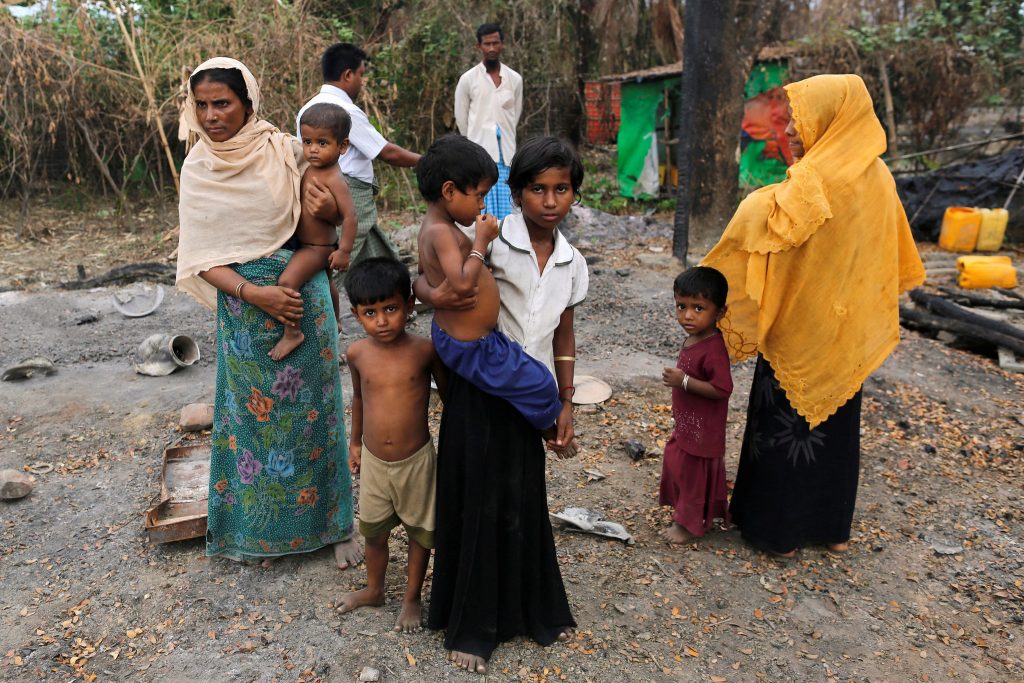Violence against the Rohingya people continues in Rakhine State in Myanmar. Armed forces are “killing men, slaughtering children, raping women, burning and looting houses, forcing these people to cross the river,” according to John McKissick of the UN refugee agency in neighboring Bangladesh. Rohingyas fleeing the attacks have sought refuge across the river in Bangladesh in rickety boats. Aljazeera reports that thousands of Rohingyas have attempted to cross the border in the past week, with many being turned back by Bangladeshi border guards.
This most recent surge in attacks against the religious minority stems from the murder of nine Burmese Border Guards, which some politicians blamed on a Rohingya militant group, with little or no evidence. The Myanmar military and Border Guard Police have been carrying out “retribution” on the Rohingya population, a minority as Muslims in the primarily Buddhist country. As of last week, over a hundred people had been killed, and entire villages had been burned. The Human Rights Watch has satellite images that clearly show burned out villages (slide the bar over the images to view before and after comparisons).
In 2012, 200 Rohingyas were killed and over 140,000 were forced into refugee camps by Rakhine mobs (Rakhines are a recognized ethnic group in Myanmar, unlike the Rohingyas). This ethnic cleansing was triggered by the rape and murder of a Rakhine woman by three Muslim men. Experts argue that the ensuing stages of isolation and killings of Rohingyas follow patterns that have historically led to genocide. There has not been a single prosecution, let alone conviction of those attacking the Rohingyas. Furthermore, both journalists and human rights organizations have been barred from the area, and Unicef warns that there are likely thousands of children malnourished and facing death for lack of medical care.
The Rohingyas are essentially a stateless people; refused citizenship in Myanmar, they are perjoritively called “Bengalis,” because of a flood of immigrants from Bengal into Rakhine state when the whole region was under British colonial rule. Although the Rohingya are believed by historians to have been resident in the area that is now Rakhine state since the 8th century, they were lumped in with the immigrants as the object of local resentment. Tensions were further fueled by World War II, when the British armed some Muslims to fight against the Rakhine, who had sided with the Japanese. Similarly, Bangladesh does not grant Rohingyas citizenship, and forcibly repatriated over 200,000 of them in the 90s, with assistance from the United Nations. Many Rohingyas have been fleeing to Malaysia, drawn by its comparative prosperity and Islamic heritage. Over 100,000 are thought to be in Malaysia, but they have no legal rights there either. Rohingyas fleeing Myanmar are often at the mercy of extortive human traffickers, and many die in transit, or are held hostage until their family can pay the traffickers.
Just over a year ago, Myanmar held its first open election in 25 years. Aung San Suu Kyi, a Nobel laureate, won the election against the military-backed president. Her election inspired hope that the Rohingyas would see an end to their suffering, given her government’s focus on bringing “respect for human rights to its people.” As a result of this promise, the United States lifted economic sanctions against Myanmar in September of this year. However, the government has not responded to allegations of violence in Rakhine state, and Aung San Suu Kyi has herself said that the military’s response is based on the “rule of law”. She has also refused to call the Rohingyas by their name, referring to them instead as Bengalis. The government’s failure to intervene may be as a result of Aung San Suu Kyi’s tenuous control over the military, who had controlled Myanmar for 25 years prior to her election. The ethnic cleansing is also very popular with the majority of Myanmar’s people, so she faces little criticism within her country. Internationally, though, the pressure on the Nobel Peace Prizewinner grows as the violence escalates.

